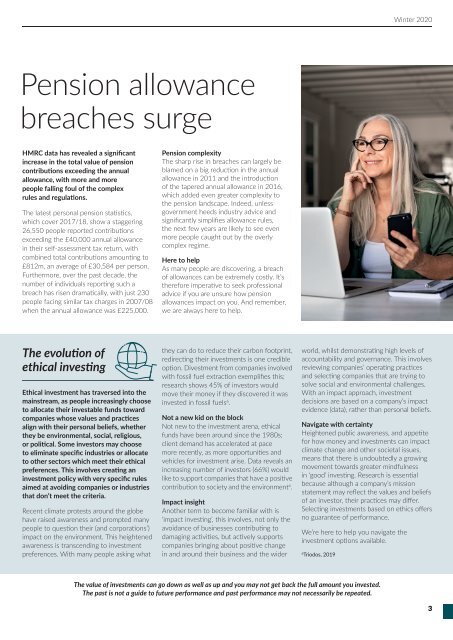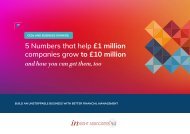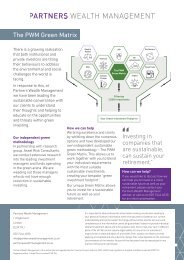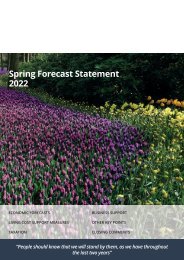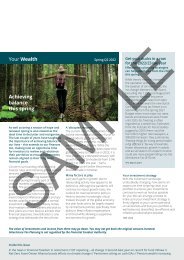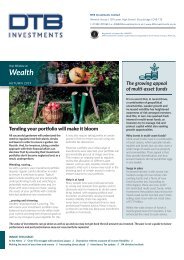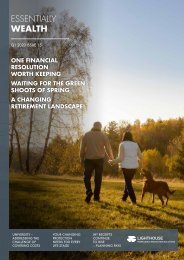59_D_D_DTB Investments Ltd_Winter Newsletter 2019_100
Create successful ePaper yourself
Turn your PDF publications into a flip-book with our unique Google optimized e-Paper software.
<strong>Winter</strong> 2020<br />
Pension allowance<br />
breaches surge<br />
HMRC data has revealed a significant<br />
increase in the total value of pension<br />
contributions exceeding the annual<br />
allowance, with more and more<br />
people falling foul of the complex<br />
rules and regulations.<br />
The latest personal pension statistics,<br />
which cover 2017/18, show a staggering<br />
26,550 people reported contributions<br />
exceeding the £40,000 annual allowance<br />
in their self-assessment tax return, with<br />
combined total contributions amounting to<br />
£812m, an average of £30,584 per person.<br />
Furthermore, over the past decade, the<br />
number of individuals reporting such a<br />
breach has risen dramatically, with just 230<br />
people facing similar tax charges in 2007/08<br />
when the annual allowance was £225,000.<br />
Pension complexity<br />
The sharp rise in breaches can largely be<br />
blamed on a big reduction in the annual<br />
allowance in 2011 and the introduction<br />
of the tapered annual allowance in 2016,<br />
which added even greater complexity to<br />
the pension landscape. Indeed, unless<br />
government heeds industry advice and<br />
significantly simplifies allowance rules,<br />
the next few years are likely to see even<br />
more people caught out by the overly<br />
complex regime.<br />
Here to help<br />
As many people are discovering, a breach<br />
of allowances can be extremely costly. It’s<br />
therefore imperative to seek professional<br />
advice if you are unsure how pension<br />
allowances impact on you. And remember,<br />
we are always here to help.<br />
The evolution of<br />
ethical investing<br />
Ethical investment has traversed into the<br />
mainstream, as people increasingly choose<br />
to allocate their investable funds toward<br />
companies whose values and practices<br />
align with their personal beliefs, whether<br />
they be environmental, social, religious,<br />
or political. Some investors may choose<br />
to eliminate specific industries or allocate<br />
to other sectors which meet their ethical<br />
preferences. This involves creating an<br />
investment policy with very specific rules<br />
aimed at avoiding companies or industries<br />
that don’t meet the criteria.<br />
Recent climate protests around the globe<br />
have raised awareness and prompted many<br />
people to question their (and corporations’)<br />
impact on the environment. This heightened<br />
awareness is transcending to investment<br />
preferences. With many people asking what<br />
they can do to reduce their carbon footprint,<br />
redirecting their investments is one credible<br />
option. Divestment from companies involved<br />
with fossil fuel extraction exemplifies this;<br />
research shows 45% of investors would<br />
move their money if they discovered it was<br />
invested in fossil fuels 6 .<br />
Not a new kid on the block<br />
Not new to the investment arena, ethical<br />
funds have been around since the 1980s;<br />
client demand has accelerated at pace<br />
more recently, as more opportunities and<br />
vehicles for investment arise. Data reveals an<br />
increasing number of investors (66%) would<br />
like to support companies that have a positive<br />
contribution to society and the environment 6 .<br />
Impact insight<br />
Another term to become familiar with is<br />
‘impact investing’, this involves, not only the<br />
avoidance of businesses contributing to<br />
damaging activities, but actively supports<br />
companies bringing about positive change<br />
in and around their business and the wider<br />
world, whilst demonstrating high levels of<br />
accountability and governance. This involves<br />
reviewing companies’ operating practices<br />
and selecting companies that are trying to<br />
solve social and environmental challenges.<br />
With an impact approach, investment<br />
decisions are based on a company’s impact<br />
evidence (data), rather than personal beliefs.<br />
Navigate with certainty<br />
Heightened public awareness, and appetite<br />
for how money and investments can impact<br />
climate change and other societal issues,<br />
means that there is undoubtedly a growing<br />
movement towards greater mindfulness<br />
in ‘good’ investing. Research is essential<br />
because although a company’s mission<br />
statement may reflect the values and beliefs<br />
of an investor, their practices may differ.<br />
Selecting investments based on ethics offers<br />
no guarantee of performance.<br />
We’re here to help you navigate the<br />
investment options available.<br />
6<br />
Triodos, <strong>2019</strong><br />
The value of investments can go down as well as up and you may not get back the full amount you invested.<br />
The past is not a guide to future performance and past performance may not necessarily be repeated.<br />
3


